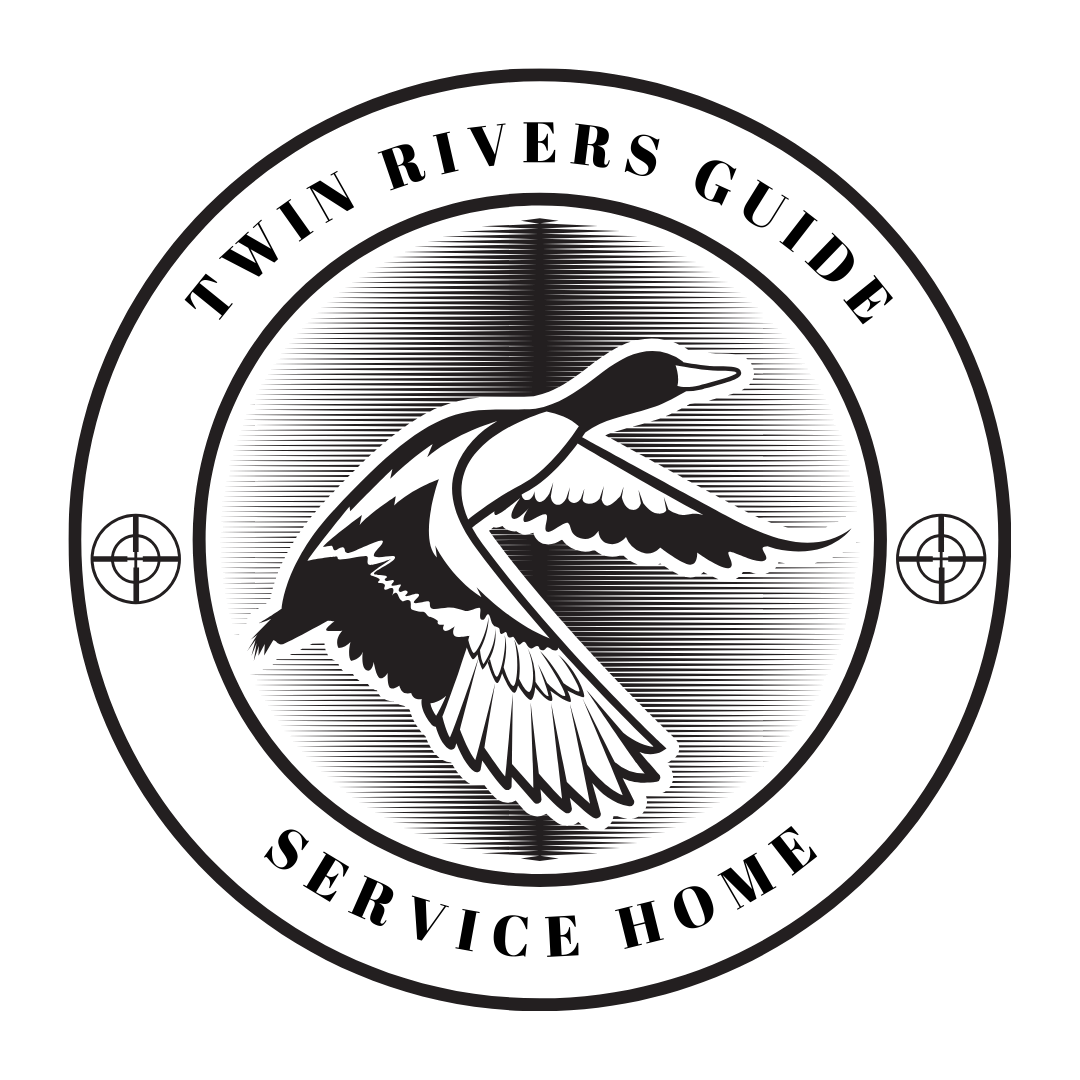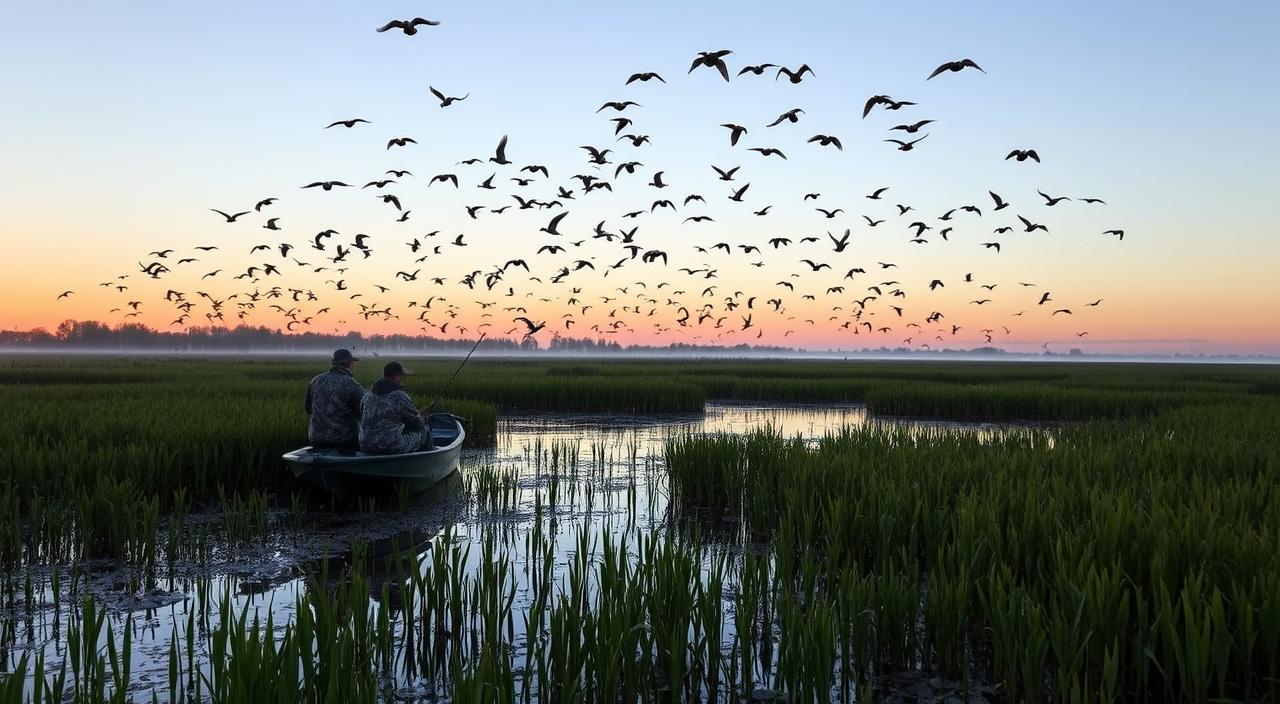As autumn’s cool air fills the Natural State, duck hunters get ready for Arkansas’s duck season. This tradition is deeply rooted in the area. It gives both locals and visitors a chance to dive into the rich waterfowl hunting heritage.
Arkansas is known for its wide variety of ducks and top-notch hunting spots. It’s a top choice for those looking for a memorable outdoor adventure.
The upcoming duck hunting season in Arkansas is set to be exciting. Hunters need to know the guidelines and dates to have a successful and responsible hunt. This guide will cover important details on licenses, regulations, and equipment. It aims to help you make the most of your time in Arkansas’s waterfowl hunting areas.
Overview of Duck Hunting in Arkansas
Arkansas is famous for duck hunting. Its wetlands and waterways attract many hunters. You can find mallards and wood ducks here, among others.
The Rich Heritage of Duck Hunting
Duck hunting in Arkansas started in the early 1900s. The area’s wetlands and waterfowl drew hunters from everywhere. Stuttgart is known as the “Rice and Duck Capital of the World.” It hosts the Duck Fest celebration every year, attracting many.
Popular Duck Species in Arkansas
Arkansas has many duck species. You can find mallards and wood ducks here. The state’s wetlands and rice fields are perfect for hunting.
Prime Hunting Locations
Arkansas has great places for duck hunting. The Stuttgart area is a favorite with its rice fields. Other top spots include the White River National Wildlife Refuge and the Cache River National Wildlife Refuge.
Arkansas Duck Hunting Season Dates and Zones
As a hunter in Arkansas, knowing the duck hunting season dates and zones is key. The Arkansas Game and Fish Commission sets these rules to help hunting stay sustainable. This way, everyone gets a fair chance to enjoy the outdoors.
The duck hunting season in Arkansas has two parts. The first part is from late November to early December. The second part is from mid-December to late January. But, the exact dates change each year, so always check the latest season calendar.
Arkansas is split into two hunting zones: the North Zone and the South Zone. The North Zone is in the north, and the South Zone is in the south. This division helps the Arkansas Game and Fish Commission manage hunting better. It ensures the hunting is balanced and responsible for each area.
| Zone | Season Dates |
|---|---|
| North Zone | Late November – Early December Mid-December – Late January |
| South Zone | Late November – Early December Mid-December – Late January |
Knowing the duck hunting season dates and zones in Arkansas helps hunters plan better. It ensures they follow the state’s rules. Whether you’re new or experienced, knowing these details can greatly improve your hunting trip.
Essential Licenses and Permits for Duck Hunting
Duck hunting in Arkansas needs careful planning. You must know the licenses and permits required. This is true for both resident and non-resident hunters. The Arkansas Game and Fish Commission sets these rules for a legal hunt.
Resident vs Non-Resident Requirements
Arkansas residents have it easier. They just need a hunting license from the Arkansas Game and Fish Commission. Non-residents must get a waterfowl permit too, along with their hunting license.
Federal Duck Stamp Information
All duck hunters in Arkansas need a Federal Duck Stamp. This stamp is a federal rule. It helps fund conservation and protects waterfowl for the future.
State-Specific Permits
- In Arkansas, you might need more permits, like a waterfowl permit. This depends on where you hunt and what you hunt.
- Always check the latest rules from the Arkansas Game and Fish Commission. This ensures you follow all laws.
Knowing the licenses and permits is key for a good duck hunting trip in Arkansas. It makes sure your hunt is safe, legal, and fun.
Regulations and Bag Limits
As avid duck hunters in Arkansas, knowing the state’s hunting rules is key. These rules help protect our waterfowl friends.
The daily bag limit for ducks is 6 birds. This rule helps hunters enjoy their sport while keeping waterfowl numbers healthy. Hunters can have up to 18 ducks in their possession at any time.
| Regulation | Limit |
|---|---|
| Daily Bag Limit | 6 ducks |
| Possession Limit | 18 ducks |
These rules come from careful work by wildlife experts and conservation groups. Following them helps keep Arkansas’s waterfowl thriving. This way, we ensure these birds stay with us for years to come.
Remember, these rules might change. Always check with the Arkansas Game and Fish Commission for the latest before your next hunt.
Equipment and Preparation Guidelines
Successful duck hunting in Arkansas needs more than just a sharp eye and patience. You must have the right gear for a fun and productive hunt. The right duck hunting equipment, from waterproof waders to reliable shotguns and effective duck calls, is key.
Required Hunting Gear
When you head out to the Arkansas wetlands, make sure you have these essential items:
- Insulated, waterproof waders to keep you dry and comfortable
- A sturdy, well-maintained shotgun in the appropriate gauge
- A varied selection of duck calls to mimic the sounds of your target waterfowl
- Camouflage clothing that blends seamlessly with the natural environment
- A comfortable, easy-to-access hunting blind or layout boat
- A reliable GPS device or map to navigate the hunting grounds
Duck Calling Techniques
Mastering duck calling is vital for any serious Arkansas duck hunter. Learning the basic quack to the complex trailer call can boost your success. Practice with different calls and watch ducks to perfect your technique.
Decoy Strategies
Placing decoys is crucial in duck hunting in Arkansas. Arrange your decoys in a natural pattern to attract waterfowl. Try different decoy setups, like a mixed-species spread or lone drake decoys, to draw in curious birds.
Conclusion
As the Arkansas duck hunting season starts, it’s key to be well-prepared. Knowing the rules and dates is crucial. Also, having the right gear and licenses is important for a good hunt.
Arkansas is a great place for duck hunting, with its rich history and many duck species. It’s important to hunt safely and responsibly. This way, we can keep this tradition alive for future hunters.
This guide has given you all the info you need for a successful hunt in Arkansas. Always put safety first and respect the environment. Follow the highest ethical standards as you enjoy your waterfowl adventures in the Natural State.

